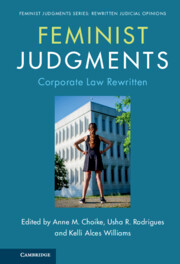Book contents
- Feminist Judgments: Corporate Law Rewritten
- Feminist Judgments Series Editors
- Advisory Panel for Feminist Judgments Series
- Feminist Judgments: Corporate Law Rewritten
- Copyright page
- Dedication
- Contents
- Advisory Panel for Feminist Judgments: Corporate Law Rewritten
- Notes on Contributors
- Acknowledgments
- About the Cover Art
- Table of Cases
- Part I Introduction and Overview
- Part II Legal Personality, Identity, and Limited Liability of Corporate Entities
- Part III Role and Purpose of the Corporation and Corporate Combinations in Society
- 4 Commentary on Dodge v. Ford Motor Company
- 5 Commentary on Merriam v. Demoulas Super Mkts.
- 6 Commentary on Revlon, Inc. v. MacAndrews & Forbes Holdings, Inc.
- 7 Commentary on Agreement between Harvey Weinstein and The Weinstein Company Holdings LLC, as of October 20, 2015
- Part IV Fiduciary Duties in Corporate Governance
- Part V Closely Held Businesses and Other Considerations Regarding the Composition of Boards, Management, and Owners
- Part VI Protecting Investors and Potential Investors in Corporations
- Part VII From Foundations to Future Directions
- Index
7 - Commentary on Agreement between Harvey Weinstein and The Weinstein Company Holdings LLC, as of October 20, 2015
from Part III - Role and Purpose of the Corporation and Corporate Combinations in Society
Published online by Cambridge University Press: 15 January 2023
- Feminist Judgments: Corporate Law Rewritten
- Feminist Judgments Series Editors
- Advisory Panel for Feminist Judgments Series
- Feminist Judgments: Corporate Law Rewritten
- Copyright page
- Dedication
- Contents
- Advisory Panel for Feminist Judgments: Corporate Law Rewritten
- Notes on Contributors
- Acknowledgments
- About the Cover Art
- Table of Cases
- Part I Introduction and Overview
- Part II Legal Personality, Identity, and Limited Liability of Corporate Entities
- Part III Role and Purpose of the Corporation and Corporate Combinations in Society
- 4 Commentary on Dodge v. Ford Motor Company
- 5 Commentary on Merriam v. Demoulas Super Mkts.
- 6 Commentary on Revlon, Inc. v. MacAndrews & Forbes Holdings, Inc.
- 7 Commentary on Agreement between Harvey Weinstein and The Weinstein Company Holdings LLC, as of October 20, 2015
- Part IV Fiduciary Duties in Corporate Governance
- Part V Closely Held Businesses and Other Considerations Regarding the Composition of Boards, Management, and Owners
- Part VI Protecting Investors and Potential Investors in Corporations
- Part VII From Foundations to Future Directions
- Index
Summary
The #MeToo movement exploded in the wake of Harvey Weinstein’s sexual misconduct while being a director and executive for TWC. Over 100 women have reported abuse or harassment by Weinstein in the course of his employment. Employment Agreements are given great leniency to draft around default rules in many states. As Professor Alexandra Andov describes in her commentary, the terms of Weinstein’s various employment agreements incentivized or sheltered behavior and crimes that harm women. Limited oversight and reporting, expansive indemnification provisions, underinclusive codes of conduct, and overly protective terms of termination contributed to Weinstein’s reign of terror on women around him. Professor Susan Chesler provides a modified employment contract that features narrative theory and “tone from the top” to increase accountability for employees and protection for victims. Drafting employment contracts to achieve these goals is achieved by mandated reporting of all incidents, eliminating indemnification to the wrongdoer for sexual wrongdoing, requiring compliance with investigations, and subjecting termination to cause employees to terminate without the ability to cure instances of sexual misconduct. Chesler’s contract is a starting point for transforming relationships across an entire organization, provide voice for stakeholders, and foster a culture that respects women’s dignity.
Keywords
- Type
- Chapter
- Information
- Feminist Judgments: Corporate Law Rewritten , pp. 161 - 188Publisher: Cambridge University PressPrint publication year: 2023

